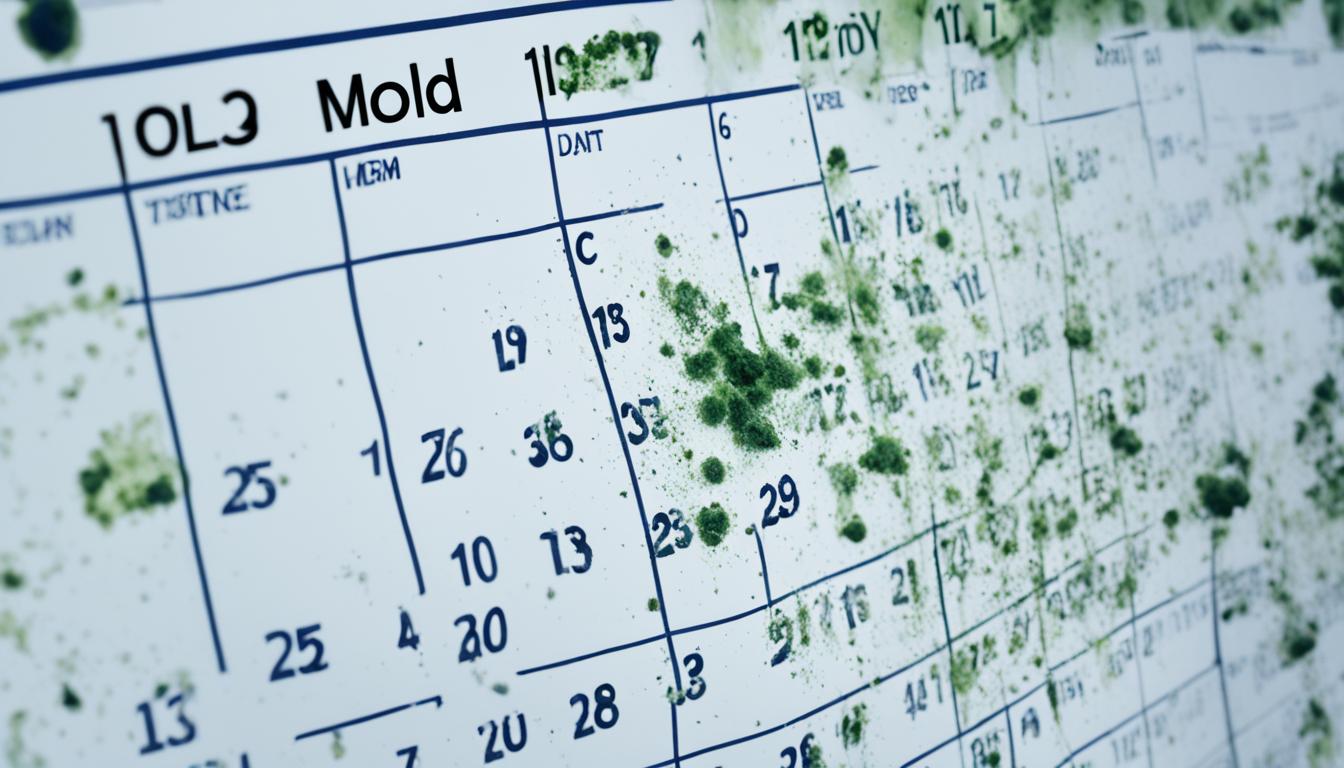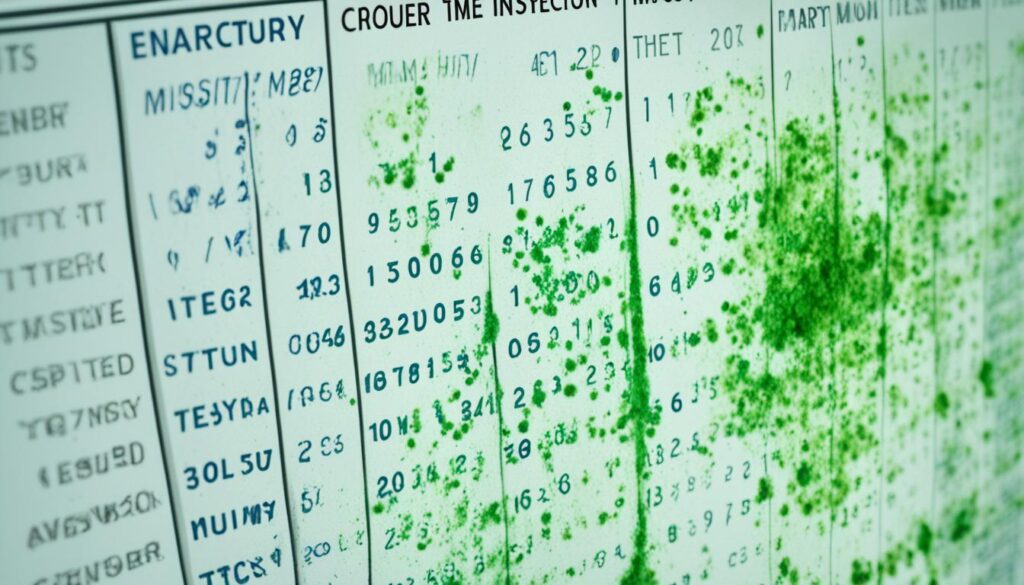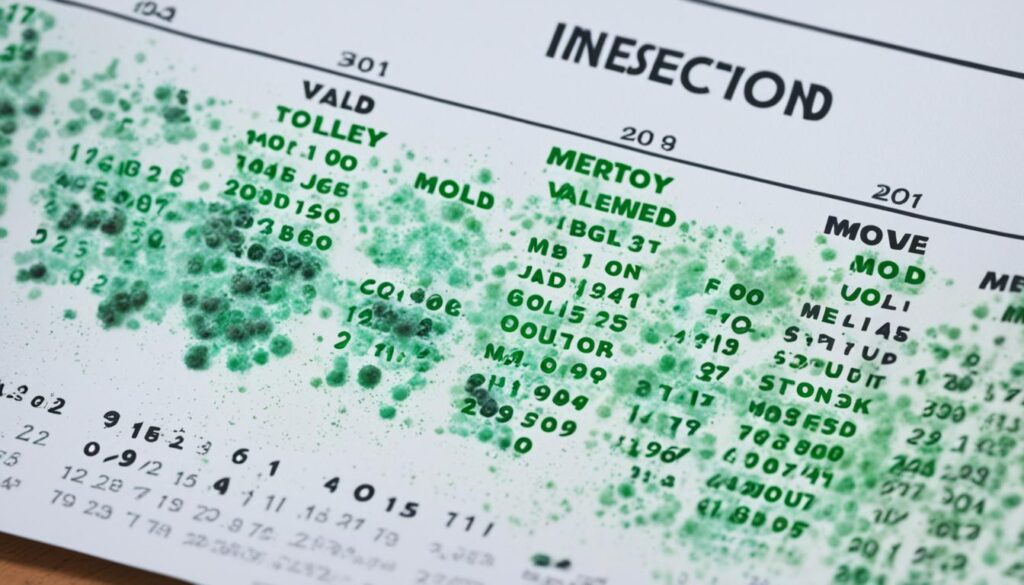
Mold Inspection Validity Period: Learn the Timeline
In this section, we will explore the timeline for mold inspection validity and gain a better understanding of how long an inspection for mold remains valid. Understanding the validity period is crucial for ensuring the safety and health of your property.
Key Takeaways:
- The mold inspection validity period refers to how long an inspection for mold remains valid.
- Regular mold inspections are essential to maintaining a safe and healthy living environment.
- Factors such as environmental conditions and property changes can affect the validity of a mold inspection.
- It is recommended to schedule a new mold inspection periodically to ensure ongoing safety and prevention of mold growth.
- Proactive mold assessment can help you avoid potential health risks and costly remediation efforts.
Factors Affecting Mold Inspection Validity
When it comes to the validity of a mold inspection, several factors can influence its expiration date. Understanding these factors is crucial for determining how long an inspection can remain valid and the duration of its effectiveness.
One significant factor that affects mold inspection validity is environmental conditions. Moisture levels, temperature fluctuations, and humidity can all impact the growth and development of mold. These conditions can change over time, potentially rendering an inspection invalid if not reassessed periodically.
Property changes can also influence the validity of a mold inspection. Any alterations or modifications made to the structure, such as renovations or repairs, may impact the likelihood of mold growth. Any modifications to the HVAC system or changes in ventilation can affect the distribution and containment of mold spores, potentially invalidating the previous inspection.
Additionally, the presence of water damage can significantly impact the longevity of a mold inspection. Water intrusion, leaks, or flooding can introduce new moisture sources and create ideal conditions for mold to thrive. If these issues occur after an inspection, it may be necessary to conduct a new assessment to ensure accurate and up-to-date results.
Consulting an expert for comprehensive evaluation
To navigate these factors and determine the duration of a mold inspection’s validity, it is advisable to consult with a certified mold inspector. These professionals can provide a comprehensive evaluation of the property and its susceptibility to mold growth, taking into account various factors that influence inspection validity.
Expert opinion: “Regular monitoring and reassessment of mold-prone areas is essential to ensure the ongoing safety and integrity of your property. Factors such as environmental changes, property modifications, and water damage can all impact the validity of a mold inspection. By staying proactive and seeking expert guidance when needed, you can maintain a healthy and mold-free environment.” – Dr. Jessica Harrison, Certified Mold Specialist
| Factors Affecting Mold Inspection Validity |
|---|
| Environmental conditions (moisture levels, temperature, humidity) |
| Property changes (renovations, repairs, HVAC modifications) |
| Presence of water damage (leaks, flooding) |
By being aware of these factors and their potential impacts, you can make informed decisions about the validity of a mold inspection and take appropriate measures to ensure the safety of your property.

Recommended Validity Period for Mold Inspections
When it comes to mold inspections, understanding the recommended validity period is crucial for maintaining a safe and healthy living environment. A mold inspection is typically considered valid for a specific period, after which it is advisable to schedule a new inspection. This ensures ongoing safety and prevention of mold growth in your property.
While the specific validity period may vary depending on factors such as environmental conditions and property changes, it is generally recommended to have a mold inspection performed every one to two years. Regular inspections help identify any existing mold issues, prevent potential health risks, and save you from costly remediation efforts in the long run.
To determine the optimal frequency for mold inspections, you should also consider factors such as the age and condition of your property, previous mold issues, and any recent water damage incidents. If you notice any signs of mold growth or experience recurring moisture problems, it’s essential to schedule an inspection even if it falls outside the recommended timeframe.

By adhering to the recommended validity period for mold inspections, you can proactively address mold-related concerns and ensure the continued safety and well-being of your home or business. Don’t overlook the importance of regular inspections as they play a vital role in maintaining a mold-free environment.
Importance of Regular Mold Inspections
In order to maintain a safe and healthy living environment, it is essential to understand the importance of regular mold inspections. By conducting proactive mold assessments, you can prevent potential health risks and avoid costly remediation efforts.
Mold can grow in hidden areas of your property, such as behind walls or under carpets, without visible signs. Regular inspections can help detect and address mold issues early on, before they become major problems.
One of the key reasons why regular mold inspections are vital is to ensure the validity of the inspection itself. Mold inspections have a validity period, and ongoing assessments are necessary to stay up to date with any changes in the property’s mold situation.
The Benefits of Regular Mold Inspections:
- Early Detection: Regular inspections allow for the early identification of mold growth, enabling prompt remediation and preventing further damage.
- Prevent Health Risks: Exposure to mold can lead to various health issues, including allergies, respiratory problems, and even infections. By conducting regular inspections, you can minimize health risks for yourself and your family.
- Protect Property Value: Mold infestations can significantly decrease the value of your property. Regular inspections help maintain the structural integrity and aesthetics of your home or business.
- Prompt Remediation: If mold is detected during a regular inspection, it can be addressed promptly, preventing the need for extensive remediation and costly repairs.
Remember that mold can grow and spread quickly, especially in damp or humid conditions. Therefore, it’s crucial to incorporate regular mold inspections into your property maintenance routine.
By staying proactive and scheduling routine inspections, you can ensure peace of mind, knowing that you have taken the necessary steps to protect your health, property, and investment.
Maintaining a Mold Inspection Timeline
Developing a mold inspection timeline is essential for keeping track of when inspections should be conducted. The timeline may vary depending on factors such as property type, location, climate, and any past mold issues.
It is generally recommended to conduct mold inspections annually, especially for properties that have experienced mold problems in the past or are located in areas prone to high humidity or dampness. However, certain circumstances may necessitate more frequent inspections.
“Regular mold inspections are like preventive medicine for your property. They help identify and address any mold issues before they become extensive and costly. Being proactive in mold prevention is key to maintaining a safe and healthy living or working environment.” – Dr. Jane Mitchell, Mold Expert.
Consulting with a professional mold inspector can help determine the ideal inspection frequency based on your specific circumstances. They can provide expertise and guidance on how often inspections should be conducted to ensure optimal mold prevention and overall property maintenance.
Conclusion
Throughout this article, we have explored the timeline and validity period for mold inspections. Understanding the duration of a mold inspection and its expiration is crucial for maintaining a safe and healthy living environment. By staying informed and scheduling regular inspections, you can prevent potential health risks associated with mold growth.
It is recommended to schedule a mold inspection every 1-2 years to ensure ongoing validity. However, certain factors such as environmental conditions and property changes can affect the inspection’s validity. Therefore, it is important to remain vigilant and consider scheduling an inspection sooner if any significant changes occur.
Should you require a mold assessment, get in touch with the experts at Fix Mold Miami at 305-465-6653. They have the knowledge and experience to conduct thorough inspections and provide effective solutions to address any mold-related concerns. Don’t compromise on the safety of your loved ones or the integrity of your property. Contact Fix Mold Miami today for peace of mind.




